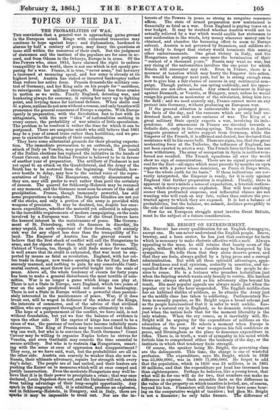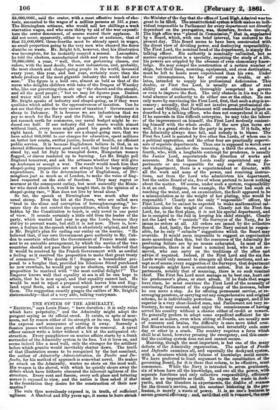MR. BRIGHT ON RETRENCHMENT.
Mx. BRIGHT has every qualification for an English demagogue, except one. He can never understand the English people. Brave, brawny, and a born orator, he has just that contempt for facts which is necessary to make rhetoric effective with a mob. Always appealing to the mass, he still retains that hearty scorn of the people, without which even a Jacobin may be hampered by his sympathies. He tells them that they alone deserve power, and that they are fools, always gulled by a lying press and a corrupt administration. But with all these splendid advantages, appa- rent frankness and real cynicism, audacity, in assertion, and un- equalled flow of words, he cannot comprehend the people he de- sires to rouse. He is a lecturer who preaches teetotalism just when the fainting wretch wants only brandy to revive. His hardest blows are always struck just as his adversary slips beyond his reach. His most popular appeals are always madejust when the popular cry is for the hour suspended. The English middle class has an habitual dislike of soldiers, so he attacks the Army just as the middle class has taken to soldiering. Parliamentary Re- form is usually popular, so Mr. Bright urges a broad scheme just as the is haveresolved that it is safer to wait awhile. Eco- nomy s a natural cry in England, so he demands retrenchment just when the nation feels that for the moment liberality is the only wisdom. When the cry comes, as it inevitably will, Mr. Bright will be arguing for the expenditure of millions on the education of the poor. He selects a moment when Europe is trembling on the verge of war to express his full confidence on peace, and Birmingham as the place to denounce expenditure in rifles. There is, in truth, a want of sympathy in his mind which forbids him to comprehend either the tendency of the day, or the instincts in which that tendency finds strength.
Of course, the speaker being Mr. Bright, the governing class are the delinquents. This time, the charge is one of wasteful profusion. The expenditure, says Mr. Bright, which in 1830
was 53,000,0001., was in 1860 71,000,0001. He forgot to add that the population, which in 1830 was 24 millions, is in 1861 30 millions, and that the expenditure per head has increased less than eighteenpence. Perhaps he believes, like a young lover, that what will do for one will do for two, that numbers can make no difference in expense. Such recondite facts as the difference in the value of the property on which taxation is levied, are, of course, beyond his ken. Financiers will fancy that they have some bear- ing on the comparative weight of taxation; but then Mr. Bright is not a financier; he only talks finance. The difference of who, like our governing class, ate up " the church and the steeple, ability and attainments, thoroughly competent to govern and all the good people ; " but we may let figures pass. Denton or even to improve the fleet. The only obstacle in his way is the and water will not have much effect on average Englishmen. total absence of authority to do either one or the other. Re can Mr. Bright speaks of industry and chapel-going, as if they were only move by convincing the First Lord, first, that such a step is ne- qualities which added to the oppressiveness of taxation. Can he cessary ; secondly, that it will not involve greetprofessioeal cla- not see that they are the very causes of taxation ? Government is mour ; and thirdly, that Parliament will understand the subject as cheap in Dahomey. It is because we are industrious that we described by a talking officer, who does not comprehend it at all.. pay so much for the Navy and the Police. If our industry did If he succeeds in this difficult enterprise, he may take the labour not ransack earth for commerce, our naval budget might be re- of the improvement on himself, the First Lord modestly content- duced one half. If our industry did not create wealth almost ing himself with the whole credit. If the new plan turns out without limit, every man might guard his goods with his own well, it is a grand stroke for the party in power. If it fails, why right hand. It is because we are a chapel-going race, that we the Admiralty always does fail, and nobody is to blame. The have added 900,0001. to our charges for education, spent millions First Sea Lord is assisted by five other Sea Lords, of whom one is on better law courts, swifter justice, boards of health, an efficient a political apprentice, and the other four are practically snpervi- public service. It is because Englishmen believe in God, in an sors of separate departments. Thus one is supposed to watch over eternal difference between good and evil, that they hold it base to the victualling, another the manning, a third the stores, and a stand by, and let Italy be trampled down, Hungarian women fourth, who, with a laughable contempt for prudence, is usually flogged, or slaves rendered up to burning. Let Mr. Bright poll the Junior Lord, superintends the direction of works aad. England tomorrow, and ask the artisans whether they will give accounts. Not that these Lords really superintend any de- up Anderson or accept a war. The result would teach him that partrnents or are responsible for any one of them. For chapel-going propensities are not always fatal to large military each department, there is a superintendent or director, with expenditure. It is the determination of Englishmen, of Bir- all the work and none of the power, and receiving histruc- mingham just as much as of London, to make the voice of Eng- tions, not from the Lord who administers his department,. land respected on the side of freedom. They may regret or but the entire Board of six, five of whom pretend to know nothing murmur at the consequent outlay, but most assuredly the Minis- about the matter. Of course, under such a system, responsibility ter who dared check it, would be taught that, in the opinion of a is at an end. Suppose, for example, the Warrior had sunk on chapel-going race, " Man does not live by bread alone." reaching the water, and, on examination, the fault appeared to be So far, the speech at Birmingham was much after the a miscalculation as to the weight of her plating, who would be usual stamp. Even the hit at the Peers, who are called men responsible ? Clearly not the only " responsible " officer, the "bred in the slime and corruption of boroughmongering," be- First Lord, for he cannot be expected to make mathematical cal- cause they do not control the expenditure, which they are for- culations about the weight of iron. Clearly not the First Sea. bidden by the. Constitution to touch, is only novel in one point Lord, for, in the first place, it is not his special department, and of view. It sounds certainly a little odd from the leader of the he is occupied to the full in keeping his chief straight. Clearly party, which wanted last year to gag the Lords, because they not the Lord who " controls" the Surveyor of the Navy, for he try to prevent waste, but still it is not new. There is, how- issues no orders at all. All orders are issued by the collective ever, a feature in the speech which is absolutely original, and that Board. And, lastly, the Surveyor of the Navy cannot be respon- ie Mr. Bright's plan for ending our outlay on the marine. "He sible, for he only " submits" suggestions which the Board may believed that, if our own Government gave authority to Mr. Cob- override. It would seem impossible to suggest an organization den to ascertain whether the Government of France would con- more anarchical than this, but the resources of the Admiralty for sent to an amicable arrangement, by which the navies of the two producing failure are by no means exhausted. In most of the countries should not pass their present bounds—he believed that departments, there is at least a nominal head, who is not re- it would be received by the French Government with as cordial moved, who can carry on the traditions of the office and a feeling as it received the proposition to make that great treaty advise if required. Indeed, if the First Lord and the six Sea of commerce." Who doubts it ? Suppose a householder pro- Lords would only consent to abnegate all their functions, and ac- posed to a burglar that, provided his felonious friend purchased cept as of course,every suggestion of the Surveyor, that department no new crowbars, he would put up no shutters, would not that for example might have a consistent action. But in some de- proposition be received with "the most cordial delight ?" The partments, notably that of manning, there is no such nominal Emperor knows well that equality at sea is all he can hope to chief. The First Sea Lord must manage as he best can, hunt oat attain, that he is now equal, and that equality cannot last. He his predecessor's plans, or start afresh. If he finds that wages would be mad to reject a proposal which leaves him and Eng- have risen, he must convince the First Lord of the necessity of land equal fleets, and a most unequal power of concentrating convincing Parliament of the expediency of the increase, before them. The suggestion exactly guages the calibre of Mr. Bright's he can move a step. As for offering permanent service, or re-



























 Previous page
Previous page